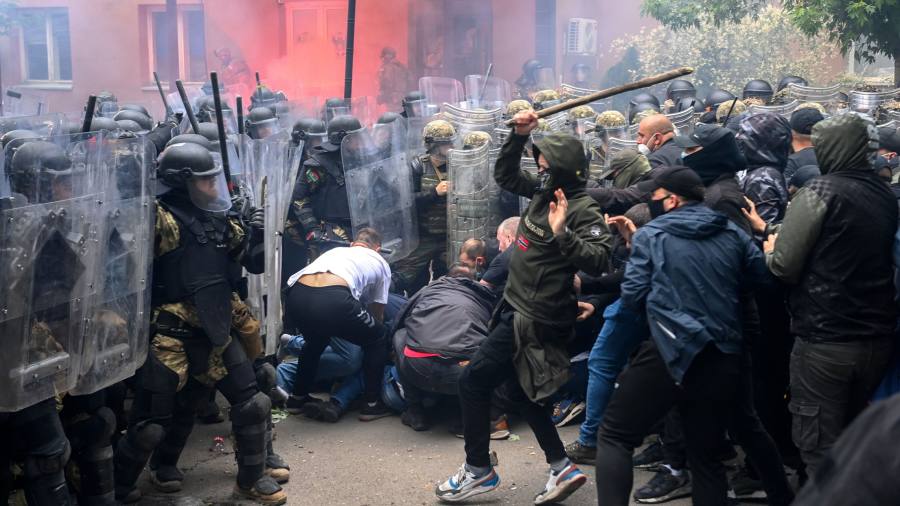Kosovo erupted in the year’s worst clashes between ethnic Serbs and Albanians on Monday as tensions escalated over a disputed election last month, leading to dozens of casualties among mostly Serb protesters and injuries to about 25 Nato peacekeepers.
The violence broke out as Serb demonstrators tried to block newly elected ethnic Albanian mayors from taking office after widely boycotted elections last month in Kosovo’s contested north. The clashes raised fears of a deepening conflict with the potential to spread through the region just as the two sides had come close to a co-operation deal.
Italian and Hungarian peacekeepers from Nato and the Nato-led international force KFOR were injured by projectiles or incendiary devices as they tried to defend city halls in the northern districts, KFOR stated.
“While countering the most active fringes of the crowd, several soldiers of the Italian and Hungarian KFOR contingent were the subject of unprovoked attacks and sustained trauma wounds, with fractures and burns due to the explosion of incendiary devices,” KFOR said.
While Serbs are a small majority in Kosovo as a whole, they populate most of the four northern districts that held elections in April. Serbs boycotted the vote after their demands for establishing an association of Serb-majority municipal governments were not met by the central government in Pristina.
As a result, the vote ended with a turnout of less than 4 per cent. With no participation threshold in Kosovo’s elections, the vote yielded Albanian mayors in all four districts. As the mayors tried to assume office this week, Serbs, who reject the election results as illegitimate, attempted to block them from entering municipalities.
In a live video feed from Zvecan, Hungarian KFOR peacekeepers could be seen pushing back an angry crowd. Tear gas used by both sides billows in the air as the special forces are heard yelling to one another: “The crowd is throwing bottles. They just lit a torch.”
Western powers condemned both the violence of the mostly Serbian crowds and the Albanian central authorities’ push to proceed with enforcing the results of the election. The EU has described the election as legal but far from “business as usual”.
Nato said the attacks on their personnel were unprovoked, adding: “Such attacks are totally unacceptable. Violence must stop immediately. We call on all sides to refrain from actions that further inflame tensions and to engage in dialogue.”
The Serb and Albanian sides each blamed the other.
Serbia’s president Aleksandar Vučić has raised the army’s combat readiness to the highest level, defence minister Miloš Vučević said, adding that he had included “additional instructions for the deployment of the army’s units in specific, designated positions”, without elaborating.
Kosovo’s president Vjosa Osmani claimed that Serbia was destabilising Kosovo.
“Serb illegal structures turned into criminal gangs have attacked Kosovo police, KFOR (peacekeeping) officers and journalists,” Osmani wrote on Twitter, adding that they “carry out Vucic’s orders”, without substantiating those claims.
US ambassador to Kosovo Jeffrey Hovenier met Kosovo’s premier Albin Kurti and said afterwards: “We are concerned . . . about violence against official property.”
“We’ve heard about attacks on journalists: we condemn that. That is not an appropriate response,” he added.
Kurti said the violence was unacceptable, adding that “ultra-nationalistic Serb graffiti on Nato vehicles is a dark reminder in Kosova”, referring to Serbs spray-painting Nato vehicles with the letter Z, a Russian marking used in the war in Ukraine.
Serbs in Kosovo have consistently denied ties to Russia but many harbour sympathies with Moscow, long a Slavic ally of Belgrade.
Additional reporting by Henry Foy in Brussels
Read the full article here




